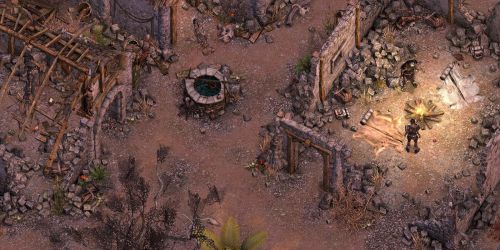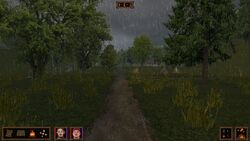Realms Beyond Kickstarter Update #11: Lore Update #3 - The Wildlands and Virduris
Realms Beyond Kickstarter Update #11: Lore Update #3 - The Wildlands and Virduris
Game News - posted by Infinitron on Thu 8 November 2018, 01:57:40
Tags: Ceres Games; Realms Beyond: Ashes of the FallenToday's Realms Beyond Kickstarter update introduces the region of the game world known as The Wildlands. It's an orc-infested no man's land, fallen to savagery after the Great Cataclysm and contested by three squabbling pretender kingdoms. Plus there are the tribes of refugees from nearby Pshent, a land overrun by the undead. The player will get to choose which of these factions he wants to side with - one of the three kingdoms, the refugees or even the orcs. Here's an excerpt from the update:


The Wildlands are one of the most turbulent and unstable areas in Argea. It is a region of numerous different cultures, as humans from all corners of the world came to settle there after the local kingdoms had collapsed and fallen. A land of opportunity, with the riches of the past and abundant natural resources rife for the taking. After centuries of conflict, collaboration, and consolidation, the Wildlands had become a relatively stable region attracting merchants, adventurers and researchers from all across Argea.
But the Great Cataclysm changed everything. Even though the region was spared from volcanic activity, massive earthquakes leveled the major cities and left the survivors with half-collapsed piles of rubble to live in. A large part of the population returned to the lands their ancestors had come from, leaving their ruined homes behind. But those who stayed were not left to rebuild in peace: from the south, orcish hordes pushed into the Wildlands, forcing the humans to take up arms and defend themselves.
This common threat could have united the people of the Wildlands, but instead the vacuum of power left by the collapse caused by the Great Cataclysm led to the rise of three pretender kings fighting over who gets to rule what’s left of this once-prosperous region. Amidst this chaos, the chieftains of the tribes of Pshent, who fled from the destruction of their homeland, have sworn to stay neutral. A difficult stance in a region consumed by a war with so many different sides.
To the southwest, at the border between the Wildlands and what used to be Pshent, only the city of Khuft remains as the last remnant of a once great kingdom. Threatened by the hordes of undead that overran their homeland, more and more Pshentians leave Khuft to seek a better fortune in the Wildlands. Yet all they do is trade one threat against another.
Needless to say, adventurers and mercenaries will find many opportunities for employment in this region. Will you support one of the three pretender kings, help the tribes of Pshent protect their independence, or even join the orcish raiding parties as they push deeper into human lands?
Kalgerth is the strongest of the three pretenders, or at least that’s what he likes to claim. He is seated in the city of Antir, the only city in the Wildlands whose walls are still mostly intact. Holding it gives him more legitimacy than his rivals, but his claims to be the de-facto ruler of the Wildlands are just that – claims. He doesn’t even unite half the population under his rule, and he is too indecisive a ruler to bring more villages under his control. He may have the most solid base for kingship among all three pretenders, but unless he adopts a more bold strategy, his opponents may soon outmaneuver him.
What Marek lacks in territory, he makes up for with a fierce army and ruthless command. He may not control as many villages as Kalgerth or Naraya, nor does he have a city as strong as Antir as the seat of his power, but he has plenty of swords and knows how to use them. He wages a ruthless guerrilla war against Kalgerth, ambushing patrols of his soldiers, and occupies villages so their population has no choice but to accept him as their rightful king. His methods may be effective, but they do not win him much support among the common populace.
Naraya is known for being an eccentric ruler who cares little about warfare and stays mostly out of the conflict between Kalgerth and Marek. Once, she had invited a cobbler from far Pyrrhenia to fashion sandals like Mirvala’s for her, but sent him away again when he didn’t bring her flowers as a gift. She considered it disrespectful of him to not arrive with a gift, and what better gift for a queen of her beauty than a beautiful bouquet of blooming flowers? Despite her eccentricity, her territory is prosperous, as neither Kalgerth nor Marek consider her a serious contender to their kingship. And yet she is far from weak, with well-equipped troops guarding her borders.
The tribes of Pshent have declared their neutrality in the conflict, but chieftess Duniba knows it cannot last. She wants to unite the different tribes under one banner to defend their independence against the pretender kings, who want to win them over to their cause and involve them in pointless fighting. But the tribes are too reluctant, too adamant in their neutrality. She fears it may need a catastrophe to convince the other tribes of joining her cause, but she still hopes the people of Pshent will realize the need for a strong leadership before it is too late. Of course, she only wishes to lead for the good of her people, not for personal ambitions…
To make things even more interesting, the Wildlands are also the site of the ancient fallen empire of Virduris. The region is dotted with Virdurian ruins, some of which were excavated by researchers from neighboring kingdoms before the Great Cataclysm. It certainly sounds like the game's most ambitious area. Perhaps that's why they saved it for last.


The Wildlands are one of the most turbulent and unstable areas in Argea. It is a region of numerous different cultures, as humans from all corners of the world came to settle there after the local kingdoms had collapsed and fallen. A land of opportunity, with the riches of the past and abundant natural resources rife for the taking. After centuries of conflict, collaboration, and consolidation, the Wildlands had become a relatively stable region attracting merchants, adventurers and researchers from all across Argea.
But the Great Cataclysm changed everything. Even though the region was spared from volcanic activity, massive earthquakes leveled the major cities and left the survivors with half-collapsed piles of rubble to live in. A large part of the population returned to the lands their ancestors had come from, leaving their ruined homes behind. But those who stayed were not left to rebuild in peace: from the south, orcish hordes pushed into the Wildlands, forcing the humans to take up arms and defend themselves.
This common threat could have united the people of the Wildlands, but instead the vacuum of power left by the collapse caused by the Great Cataclysm led to the rise of three pretender kings fighting over who gets to rule what’s left of this once-prosperous region. Amidst this chaos, the chieftains of the tribes of Pshent, who fled from the destruction of their homeland, have sworn to stay neutral. A difficult stance in a region consumed by a war with so many different sides.
To the southwest, at the border between the Wildlands and what used to be Pshent, only the city of Khuft remains as the last remnant of a once great kingdom. Threatened by the hordes of undead that overran their homeland, more and more Pshentians leave Khuft to seek a better fortune in the Wildlands. Yet all they do is trade one threat against another.
Needless to say, adventurers and mercenaries will find many opportunities for employment in this region. Will you support one of the three pretender kings, help the tribes of Pshent protect their independence, or even join the orcish raiding parties as they push deeper into human lands?
Kalgerth is the strongest of the three pretenders, or at least that’s what he likes to claim. He is seated in the city of Antir, the only city in the Wildlands whose walls are still mostly intact. Holding it gives him more legitimacy than his rivals, but his claims to be the de-facto ruler of the Wildlands are just that – claims. He doesn’t even unite half the population under his rule, and he is too indecisive a ruler to bring more villages under his control. He may have the most solid base for kingship among all three pretenders, but unless he adopts a more bold strategy, his opponents may soon outmaneuver him.
What Marek lacks in territory, he makes up for with a fierce army and ruthless command. He may not control as many villages as Kalgerth or Naraya, nor does he have a city as strong as Antir as the seat of his power, but he has plenty of swords and knows how to use them. He wages a ruthless guerrilla war against Kalgerth, ambushing patrols of his soldiers, and occupies villages so their population has no choice but to accept him as their rightful king. His methods may be effective, but they do not win him much support among the common populace.
Naraya is known for being an eccentric ruler who cares little about warfare and stays mostly out of the conflict between Kalgerth and Marek. Once, she had invited a cobbler from far Pyrrhenia to fashion sandals like Mirvala’s for her, but sent him away again when he didn’t bring her flowers as a gift. She considered it disrespectful of him to not arrive with a gift, and what better gift for a queen of her beauty than a beautiful bouquet of blooming flowers? Despite her eccentricity, her territory is prosperous, as neither Kalgerth nor Marek consider her a serious contender to their kingship. And yet she is far from weak, with well-equipped troops guarding her borders.
The tribes of Pshent have declared their neutrality in the conflict, but chieftess Duniba knows it cannot last. She wants to unite the different tribes under one banner to defend their independence against the pretender kings, who want to win them over to their cause and involve them in pointless fighting. But the tribes are too reluctant, too adamant in their neutrality. She fears it may need a catastrophe to convince the other tribes of joining her cause, but she still hopes the people of Pshent will realize the need for a strong leadership before it is too late. Of course, she only wishes to lead for the good of her people, not for personal ambitions…














